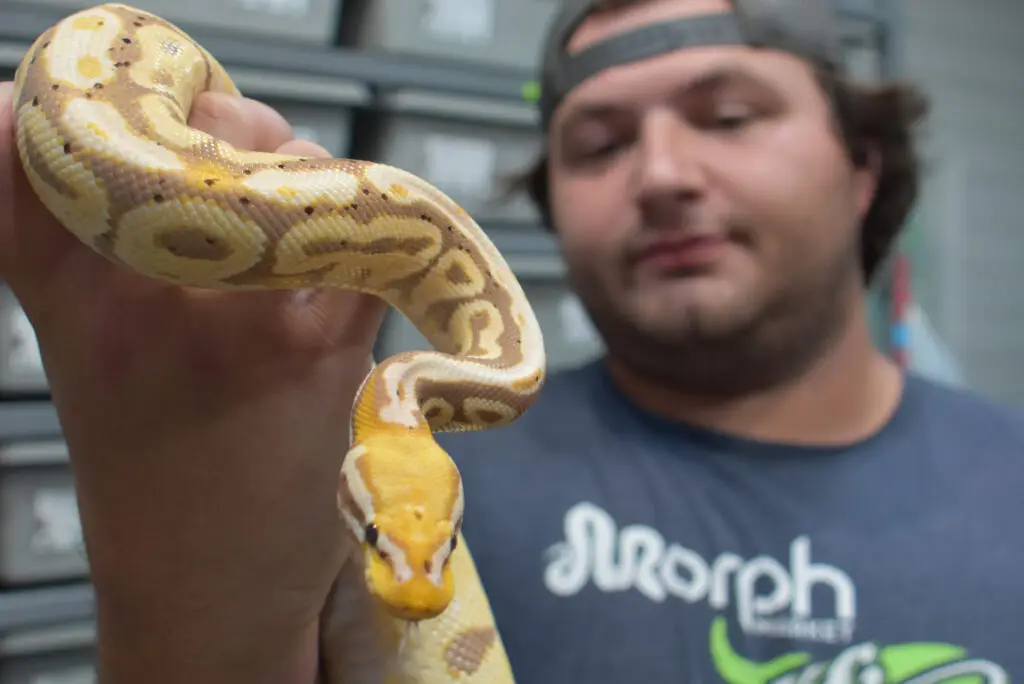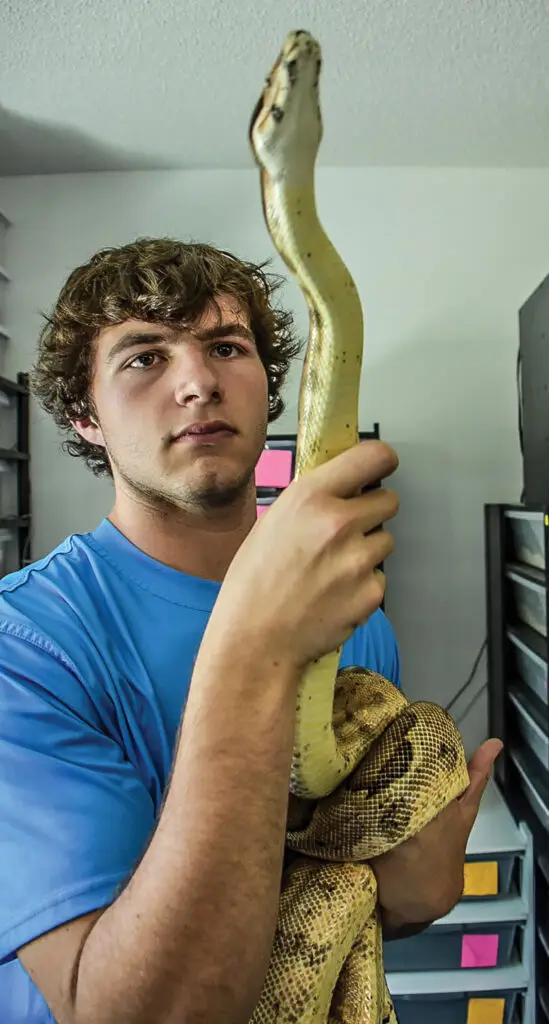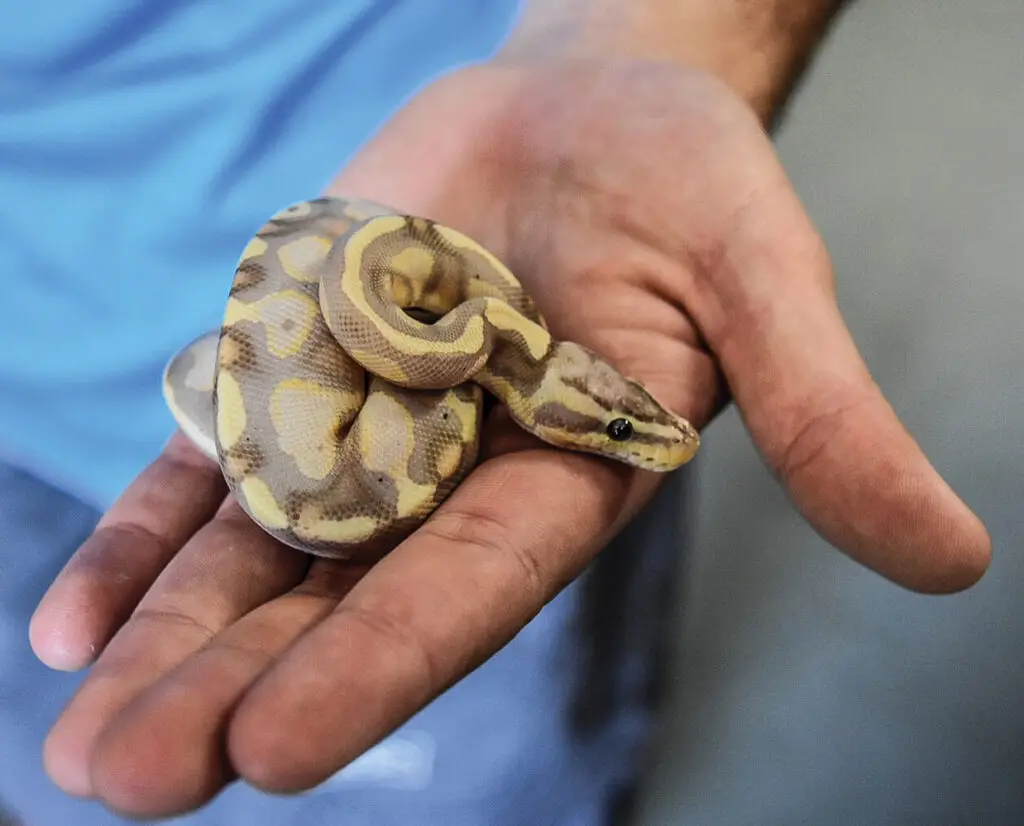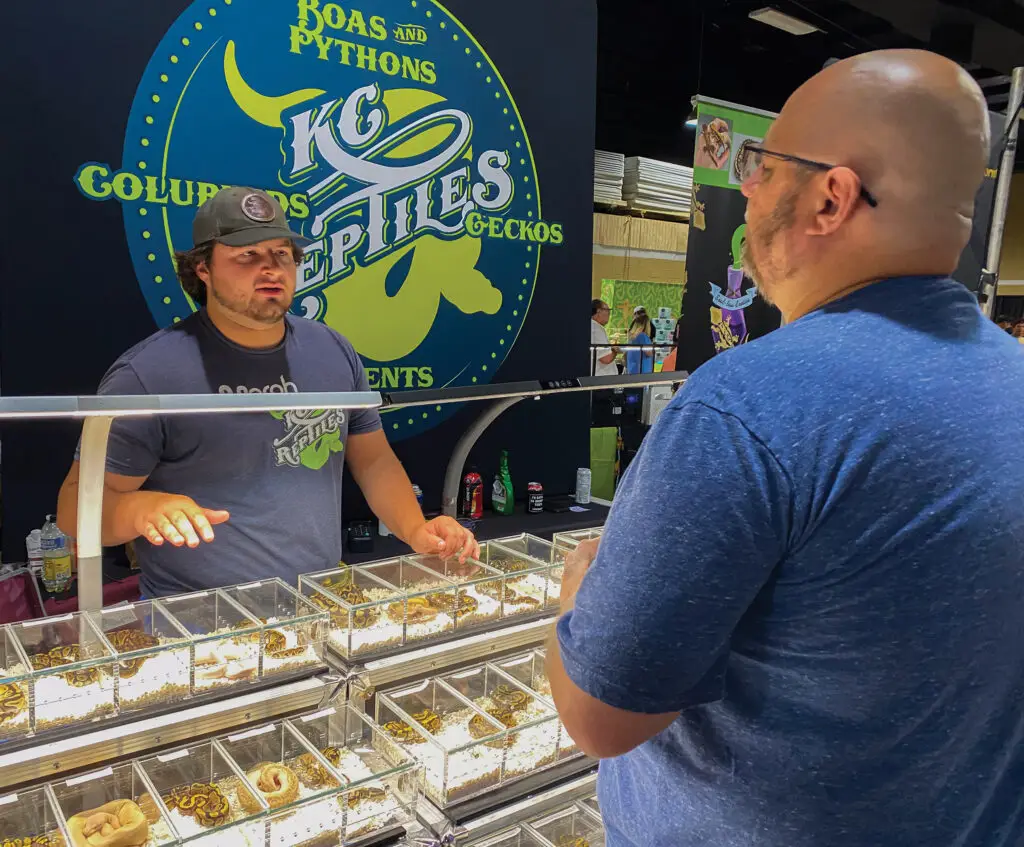
Somewhere around the age of 10, Baldwin County’s Kyle Carlisle received his first snake. It was a local species, a rat snake, common in the Bay Minette area around Kyle’s home. The boy’s interest grew and over the years more snakes were acquired, bred, and hatched. Today there are 180 saleable serpents in his house.
Kyle is in his 20s now. His snake fascination is his vocation. From two Baldwin County outlets, Loxley and Stockton, he raises and sells elongated reptiles to customers worldwide. The supply is bountiful.
In addition to the previously mentioned 180 Loxley serpents, Kyle’s Stockton location has another 500. They are mostly pythons, king snakes, corn snakes, boas and such. Collectively they are the fork-tongued livestock of Kyle’s business, KcReptiles LLC, uniting snakes with those who love them.
“Snakes are just cool,” says Kyle, from his Loxley location, as a four-foot long python coils around his arm. “They come in every color imaginable and are relatively easy to maintain.”

They are also lucrative. “After the rat snake, I bought a corn snake and later a ball python,” he recalls. “I sold my first clutch (snake eggs) for $2,000.” Not bad for a teenager.
His business launched in 2020, eventually shipping ball pythons, corn snakes, king snakes, milk snakes, and other fanged delights throughout the United States and around the world. He has sold thousands.
Global customers include the Philippines, South Korea, and until recently, China, before it cut off imports.
Now, before reading more and dreaming of reptile riches, approach with caution. As Adam may have said to Eve, “Snakes aren’t for everyone.” Kyle is licensed at local, state and federal levels. He meets all legal requirements, from Baldwin County, to internationally.
Most of Kyle’s livestock is raised in captivity, by him. None are venomous. If you want a water moccasin, take your business elsewhere.
He breeds, incubates, raises the brood, cares and feeds snakelets, in temperature-controlled environments. When ready to travel, saleable serpents are marketed through shows and online shipping.
In addition to internet sales, he supplies pet shops and shows. Kyle explains, “I do about 50 shows a year and usually sell 50 to 100 snakes per show. But I don’t participate in more than two shows a month as it is hard on the animals.”
In last June’s Gulf Coast Exotic Animal Expo, held in Mobile, hundreds flocked around the slithering menagerie, displayed in clear boxes in glass counters. Shoppers bought 50.
Prices vary. A starter snake, pet quality, goes for as little as $40. A collectible snake with desired colors and markings can be yours for a lot more. “My average ball park python sale is about $450,” Kyle notes. “The most money I have made for a single snake sale is $7,000. Now I sell plenty of $1,500 to $2,000 snakes but it takes a special person to come in and buy one for $7,000.”
Online sales require unique handling. Weather is a huge factor. During summer, the animals are shipped with a cryo-cold pack to keep them cool. In winter, the snakes journey with a heat pack.

Diverse customer base
Meanwhile, back at the office. Livestock snakes are in plastic rectangular boxes, one per box. Each box is labeled with its content and stacked, one on top of the other, building walls of snakes in various sizes and stages.
His customer base is a diverse lot. Many are collectors who value certain snakes for their color and markings.
Some are investors, buying prized snakes for breeding, in hopes of selling the babies for top dollar. Some people invest in race horses for their potential. Other’s see the same potential in snakes.
For many, snakes are pets and in often cases, the more the merrier. “I originally purchased a pair of ball pythons from Kyle,” recalls customer and friend, Dallas McVeay of Bon Secour. “Now I have about 50. Currently they are in my house but I’m building an outdoor ‘reptile room’ which they will move to.”
But Kyle warns, regardless of one’s reptilian intentions, all snakes share a commonality. “They can bite you. I have been bitten many times but it doesn’t hurt. Feels like your finger’s being pricked.”
But he adamantly continues, “Snakes are not aggressive. They are defensive. They are not out to get you but they will strike if threatened.”
So what are the signs of a threatened snake? “They hiss,” says Kyle. “Snakes don’t hiss just to hiss–they hiss to say ‘you are getting on my nerves.’ In addition, many snakes duplicate a rattlesnake’s flickering tail as a warning – ‘back off, now!’”
He adds, “People often report being chased by a snake when that is probably not the case. It is running back to a safe place, such as a hole in the ground. Often it appears the snake is chasing you when actually it is trying to flee. Unfortunately, you are standing in the way of its hideout.”
And then there is that forked-tongue flickering thing. “That’s how a snake smells,” notes Kyle. “They have a keen sense of smell, which is how they find prey.” The flickering tongue also registers data about its surroundings, including humans.

Do your research
As for pets, some species are surprisingly good at being one. “But do your research,” Kyle advises. “Learn about the snake you have in mind. Know its health requirements and care needed.”
He adds, “Others disagree, but I believe snakes do not have personalities per se. But they do have varying dispositions.” Some are calmer than others.
“If you want one that will sit on the couch and watch TV with you, get a ball python,” notes Kyle. “The ball python is the pet rock of the reptile industry.”
For those wanting a snake that is more active yet tame enough to handle, go with a milk snake, or corn snake.
Regardless of choice, above all else, provide the best care you can for the pet, collector’s item, or investment, that slithers into your life.ν




